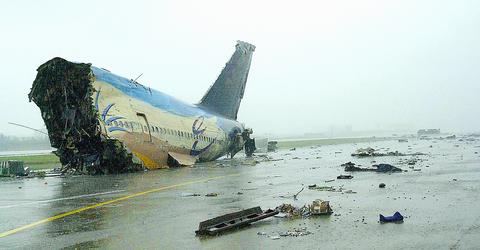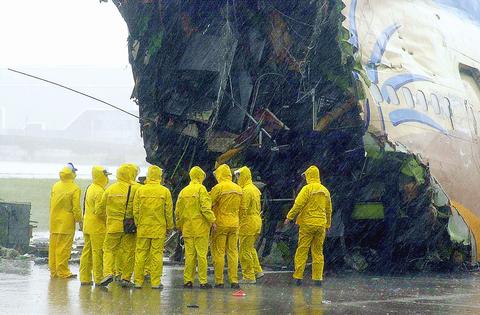The death toll in the crash of the Singapore Airlines Boeing 747-400 jumbo jet rose yesterday to 80 while the airline continued to stress that the pilot was was not to blame for the crash.
In addition to the 80 dead, 56 were still in hospital and another 44 had escaped virtually unscathed.

PHOTO: TONY K. YAO, TAIPEI TIMES
Authorities recovered the plane's two black boxes yesterday -- the voice recorder and data recorder -- and said the two were "complete and clear."

PHOTO: TONY K. YAO, TAIPEI TIMES
Investigations into reasons behind the crash were ongoing but no conclusions had yet been reached.
One possible explanation that is being closely investigated is that the pilot may have strayed onto a runway that was under repair and hit materials or equipment that were left there.
Camera footage on local television showed a damaged backhoe next to the shredded carcass of the fuselage of the plane. The backhoe appeared to have sustained damage to its hydraulic arm, although investigators could not say for certain if the damage had occurred before or after the crash.
Singapore Airlines also said that although there was a typhoon, weather conditions at the airport were within safe takeoff tolerances.
"He [the pilot] wouldn't be allowed to take off if the weather conditions were very bad," airline spokesman Rick Clements told reporters in Singapore. Clements noted that other planes were taking off around the time of the crash.
However, Clements did say that the pilot "saw an object on the runway and he tried to take off to avoid the object, and he hit the object."
Clements wouldn't say what the plane might have struck.
The government yesterday moved to minimize the possible damage that such a mishap could bring the already-embattled new government, publicly apologizing and expressing its concern for family members.
"President Chen Shui-bian (
Yu said that the president called on all departments of the government to do all they could to help passengers and their families.
Yesterday, both Chen and Vice President Annette Lu (
The premier urged the Minister of Justice to send more coroners to help speed up the process of identifying the dead.
The passenger list included 47 US citizens and 55 Taiwanese, airline officials said. There were also eight Malaysians on the flight, 11 Singaporeans, five Indonesians, 11 Indians and four Mexicans. Individuals from some 19 countries were on board.
Singapore Airlines said that it would provide all families of the victims with US$25,000 in immediate compensation, Clements said.
Speaking in Singapore, the airline's chairman, Michael Fam, said: "We wish to express our sincere regret to all concerned. This is a tragic day for all of us."
The scene was frantic at Chang Gung Hospital near the airport, where emergency room workers gently lifted injured people from ambulances. Some were burned, others lay on gurneys with broken or bruised limbs.
Y.K. Soong, the hospital's vice superintendent, said that if it hadn't been for the heavy rain, the fire might have spread through the wreckage much faster.
Dr Sally Walker, 46, a professor of Geology at the University of Georgia, escaped from the burning plane alive. While Walker said she had searched long and hard for a safe airline, her first 24-hour trip "was a nightmare."
Walker and others managed to escape the burning wreckage unharmed by following one another's voices and moving forward through the dark, smoke-filled remains of the cabin.
A complete passenger list can be found on the Internet at www.singaporeair.com/report4b.html.

NATIONAL SECURITY THREAT: An official said that Guan Guan’s comments had gone beyond the threshold of free speech, as she advocated for the destruction of the ROC China-born media influencer Guan Guan’s (關關) residency permit has been revoked for repeatedly posting pro-China content that threatens national security, the National Immigration Agency said yesterday. Guan Guan has said many controversial things in her videos posted to Douyin (抖音), including “the red flag will soon be painted all over Taiwan” and “Taiwan is an inseparable part of China,” while expressing hope for expedited “reunification.” The agency received multiple reports alleging that Guan Guan had advocated for armed reunification last year. After investigating, the agency last month issued a notice requiring her to appear and account for her actions. Guan Guan appeared as required,

Japan and the Philippines yesterday signed a defense pact that would allow the tax-free provision of ammunition, fuel, food and other necessities when their forces stage joint training to boost deterrence against China’s growing aggression in the region and to bolster their preparation for natural disasters. Japan has faced increasing political, trade and security tensions with China, which was angered by Japanese Prime Minister Sanae Takaichi’s remark that a Chinese attack on Taiwan would be a survival-threatening situation for Japan, triggering a military response. Japan and the Philippines have also had separate territorial conflicts with Beijing in the East and South China

A strong cold air mass is expected to arrive tonight, bringing a change in weather and a drop in temperature, the Central Weather Administration (CWA) said. The coldest time would be early on Thursday morning, with temperatures in some areas dipping as low as 8°C, it said. Daytime highs yesterday were 22°C to 24°C in northern and eastern Taiwan, and about 25°C to 28°C in the central and southern regions, it said. However, nighttime lows would dip to about 15°C to 16°C in central and northern Taiwan as well as the northeast, and 17°C to 19°C elsewhere, it said. Tropical Storm Nokaen, currently

PAPERS, PLEASE: The gang exploited the high value of the passports, selling them at inflated prices to Chinese buyers, who would treat them as ‘invisibility cloaks’ The Yilan District Court has handed four members of a syndicate prison terms ranging from one year and two months to two years and two months for their involvement in a scheme to purchase Taiwanese passports and resell them abroad at a massive markup. A Chinese human smuggling syndicate purchased Taiwanese passports through local criminal networks, exploiting the passports’ visa-free travel privileges to turn a profit of more than 20 times the original price, the court said. Such criminal organizations enable people to impersonate Taiwanese when entering and exiting Taiwan and other countries, undermining social order and the credibility of the nation’s